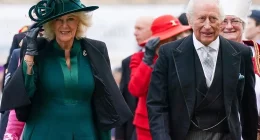The title works in ways that Prince Harry may not have intended.
In modern jargon, ‘to go spare’ means ‘to become very angry’.
The example offered by my dictionary is, ‘When she found the children drawing on the walls, she went spare’.
This could now be updated to: ‘Whenever Harry spoke of his family, he went spare.’


Spare is a book suffused with rage: rage at his father, his father-in-law, his stepmother, his great-aunt, his staff, the press, his brother


Boys! Boys! Might Liam and Noel Gallagher be persuaded to play the title roles in William and Harry: The Musical?


Anger – what Harry calls his ‘red mist’ – appears every few pages, and sometimes leads to fisticuffs
Spare is a book suffused with rage: rage at his father, his father-in-law, his stepmother, his great-aunt, his staff, the press, his brother; particularised rage, generalised rage and sometimes, you feel, rage at life itself.
Anger – what Harry calls his ‘red mist’ – appears every few pages, and sometimes leads to fisticuffs.
In this way, the book is in strange contrast to the recent Harry & Meghan series on Netflix.
The series was soft and scented; the book is jagged and raw. From time to time, Harry writes about the benefits of therapy.
But has it made him any happier? On the evidence of this book, it may well be the disease for which it claims to be the cure.
The book opens with a quote from freewheeling American author William Faulkner: ‘The past is never dead, it’s not even past.’
Faulkner is best known for troublesome novel The Sound And The Fury about a crazy, warring family down on its uppers.
It seems unlikely that Prince Harry, who proclaims himself a non-reader, is familiar with Faulkner.


Where the series was soft and scented; the book is jagged and raw. Meghan and Harry pictured in their recent Netflix series
On the other hand his distinguished ghostwriter JR Moehringer is a fan and mentioned Faulkner several times in his prize-winning autobiography The Tender Bar.
How much of Spare is Moehringer’s and how much Harry’s?
By far the most touching and lyrical passages are about Harry’s childhood and his intense, unassuageable grief after the sudden death of his beloved mother.
Of walking with his brother behind his mother’s coffin, he writes: ‘I remember keeping a fraction of Willy in the corner of my vision and drawing loads of strength from that.


Of walking with his brother behind his mother’s coffin, he writes: ‘I remember keeping a fraction of Willy in the corner of my vision and drawing loads of strength from that’
‘Most of all I remember the sounds, the clinking bridles and clopping hooves of the six sweaty brown horses, the squeaking wheels of the gun carriage they were hauling… I believe I’ll remember those few sounds for the rest of my life because they were such a sharp contrast to the otherwise all-encompassing silence.’
In all the hoo-ha surrounding the book, there is a danger these more poignant pages will be overlooked.
In the days after his mother’s death, Harry kept thinking that she might still be alive: Had she faked her own death? Was she now hiding out somewhere in disguise?
Before very long, she would send someone to collect William and Harry and all would be well.
At his boarding school, he was encouraged to write a letter to Diana, telling her how he was feeling.
‘I have a vague memory of wanting to protest that she was still alive. Mummy would read the letter when she came out of hiding, so it wouldn’t be a total waste of effort.’
In some of his dreams, she would make a triumphant return. In others, he would bump into her on the street.
These dreams went on for years. Throughout his school years, he found studying impossible.
Learning requires memory and he had no wish to remember. Instead, he rejected his darkest thoughts and ‘declared a merciless war against my mind’.
‘A list of names, a column of numbers, a mathematical formula, a beautiful poem – to learn it, you had to upload it into the part of the brain that stored stuff, but that was the part of my brain I was resisting.’
Yes, these thoughts may sound as though they have been processed through therapy, and then through his ghostwriter, but that does not make the feelings behind them any less authentic.




In some of the Prince’s dreams, Diana would make a triumphant return. In others, he would bump into her on the street
As the book progresses, his anger and resentment build. When things go wrong, he is forever on the look-out for someone to blame, and that someone, more often than not, is his elder brother.
William ignores him at school and he ignores him again when they go to Botswana.
They regularly biff each other in the back of the car while their father is driving. That this is a regular dynamic between siblings seems never to have occurred to him.
Spare might just as easily have been titled Spar.
Read Related Also: Now private security firm patrols village where Nicola Bulley went missing
As it is, his gripes about being the Spare to the Heir soon become tiresome.
‘I was the shadow, the support, the plan B. I was brought into the world in case something happened to Willy. I was summoned to provide backup, distraction, diversion and, if necessary, a spare part. Kidney, perhaps.’
Bad luck, I suppose, to be born third-in-line to the throne and now, with the advent of George, Charlotte and Louis, to have plummeted to No 5.
But what about everyone else, situated in the high millions in the line of succession? How Spare does that leave the rest of us?
At Eton, Steinbeck’s Of Mice And Men is on the curriculum and Harry manages to read it.
He spots the resemblance between William and himself and George and Lennie, two companions who lived through the same ups and downs and who cared for each other.
He is struck by the quote, ‘A man needs someone, someone who is close. You go crazy if you don’t have anyone’.
‘So true,’ thinks Harry. ‘I wanted to share it with Willy. Too bad he was still pretending not to know me.’
Their sibling rivalry culminates in the notorious episode of William knocking Harry over in the kitchen of Nottingham Cottage, at Kensington Palace, sending his brother’s necklace flying and shattering the dog bowl.
Boys! Boys! Might Liam and Noel Gallagher be persuaded to play the title roles in William and Harry: The Musical?
Harry’s motto is not Forgive and Forget. He recalls every last brotherly spat, however petty, with forensic intensity and – guess what? – William is always to blame.


Their sibling rivalry culminates in the notorious episode of William knocking Harry over in the kitchen of Nottingham Cottage, at Kensington Palace, sending his brother’s necklace flying and shattering the dog bowl
When William marries Kate, that gives Harry someone else to blame.
We hear Meg asked Kate if she could borrow her lip gloss. Kate rummaged in her bag and ‘reluctantly’ pulled out a tube.
Meg put some on her finger and applied it to her lips.
‘Kate grimaced.’ Rather than ignore it, Harry stored the incident away, ready to list it alongside all the other grievances in his book.
When she first read Spare, did it occur to Meghan that, stuck out in California, with no one left to blame, his vengeful gaze may soon turn towards her way?
Had the press or a ‘Royal expert’ come up with this book, you can bet Harry would now be on the phone to his lawyer or to Oprah Winfrey, or both, railing against this monstrous invasion of his privacy.
‘Does the public really need to know about my family disagreements, how I killed 25 Taliban soldiers (‘chess pieces removed from the board’), my drug-taking, the older woman who took my virginity in a field behind a busy pub, ‘treated me not unlike a young stallion’ and ‘smacked my rump’?’
‘What possible public interest is served by making public the various Freudian remedies I once applied to my frostbitten penis?
‘(‘My mum used to put that [Elizabeth Arden cream] on her lips. You want me to put it on my todger?’).’
For those of us who love Royal tittle-tattle, the book is a treasure trove.
By the end, we know that he disliked Princess Margaret (‘she could kill a house plant with one scowl… I kept my distance’), that he has conducted conversations, both sober and drug-addled, with, among others, a fox, seal and a bathroom pedal bin, that he once hit his bodyguard in a drunken rage, that he worries about the feng shui at Balmoral and that he is circumcised – ‘I was snipped as a baby’.
You could argue that anyone has the right to invade their own privacy. Yet still all this gossip seems strange, coming from a young man who claims to have given up his Royal duties and chosen to emigrate to California because he could no longer bear the intrusion.
At one point, he bitterly attacks Diana’s hammy old butler Paul Burrell for telling everything in his memoirs.


we know that he disliked Princess Margaret ‘she could kill a house plant with one scowl… I kept my distance’
It was, says Harry, ‘merely one man’s self-justifying, self-centring version of events’.
But isn’t this exactly what he has just done? It is one thing to tell your own secrets and quite another to betray the secrets of your friends and family.
From the evidence in Spare, it seems Harry considers no conversation too intimate to keep from the book-buying public.
Before Prince Philip’s funeral, their father begs William and Harry not to ‘make my final years a misery’: hey presto, in it goes!
Years ago, Charles confided to Harry he was bullied mercilessly at Gordonstoun, to the extent that ‘I didn’t survive’ – and in it goes!
After all those years of braying for privacy, Harry has turned out to be the Blabbermouth’s Blabbermouth, the Snitch’s Snitch, the Prince of the Paparazzi.
He has failed to offer any of his victims the right of reply he incessantly demands for himself.
Odd then that he tells of heading his personal letters to his father, around the time of Megxit, ‘PRIVATE AND CONFIDENTIAL’, fearful that he would leak them to the media.


The headshot on the cover of Spare is so close up as to be lifesize. Anyone wanting to go to a fancy dress party as Harry need only apply an elastic band to the book and strap it round their head
He criticises the press for bending the truth, while bending it every which way himself.
He likes to portray Meghan and himself as castigated, when they weren’t.
He says the press proclaimed Meghan’s first public outing with the Queen as an ‘unmitigated disaster’, portraying her as pushy, uppity and ignorant.
But a glance at the archives shows the opposite: the press cooed over Meghan as a natural and revelled in the way the pair got on.
The headshot on the cover of Spare is so close up as to be lifesize. Anyone wanting to go to a fancy dress party as Harry need only apply an elastic band to the book and strap it round their head.
But the reaction may not be what you expect. Not long ago you would have commanded respect. Now you are more likely to provoke pity – or even contempt.




